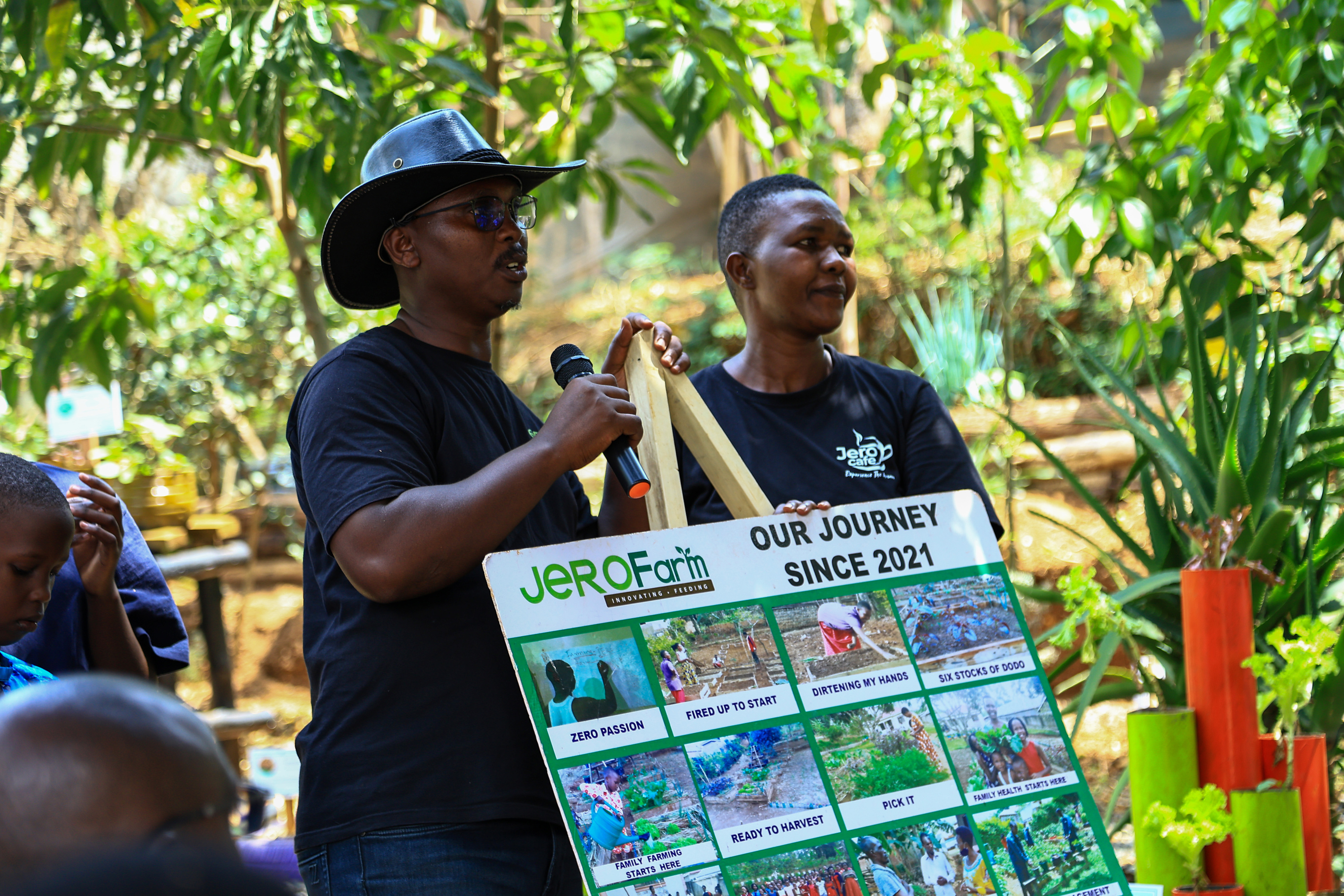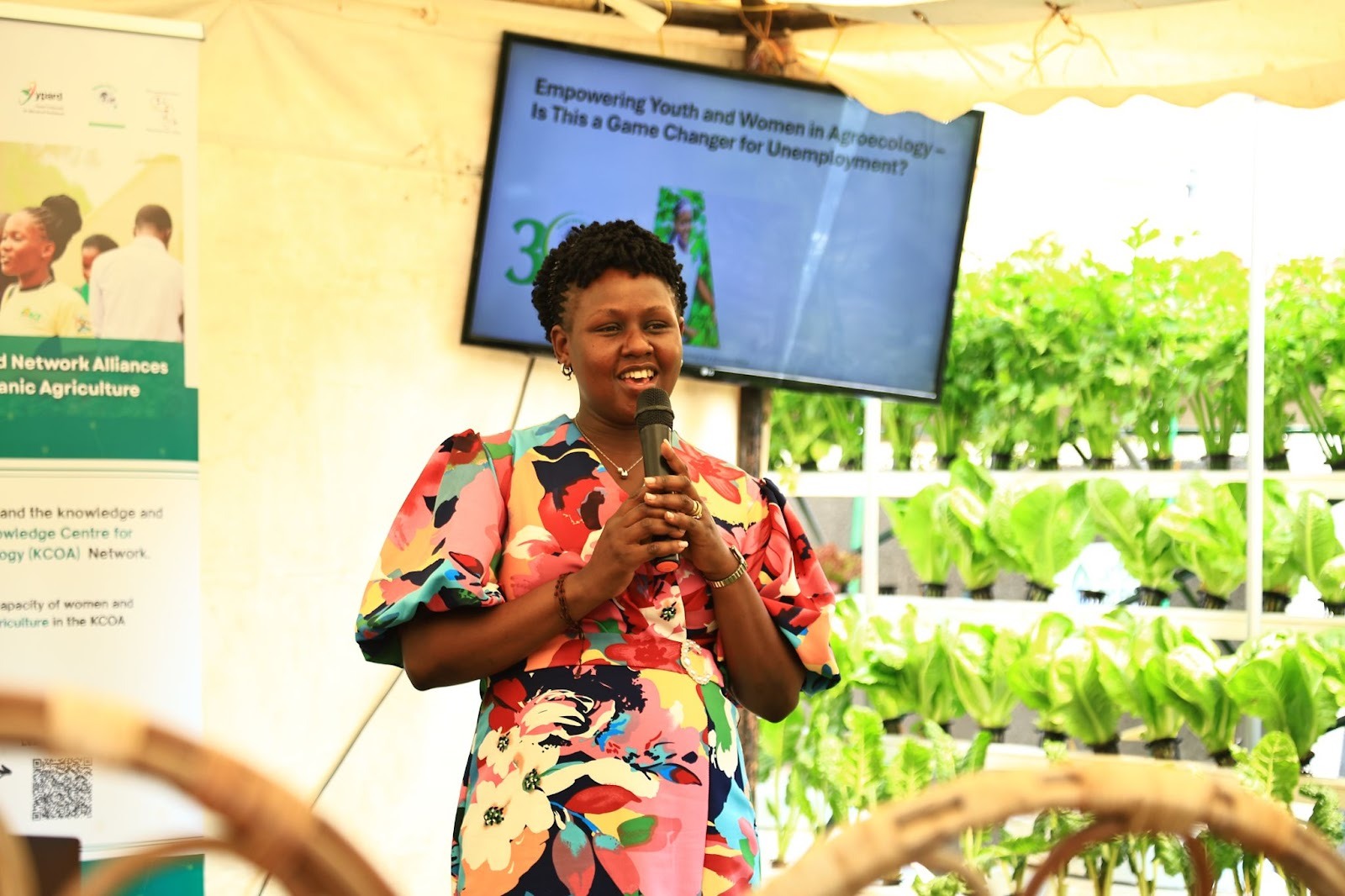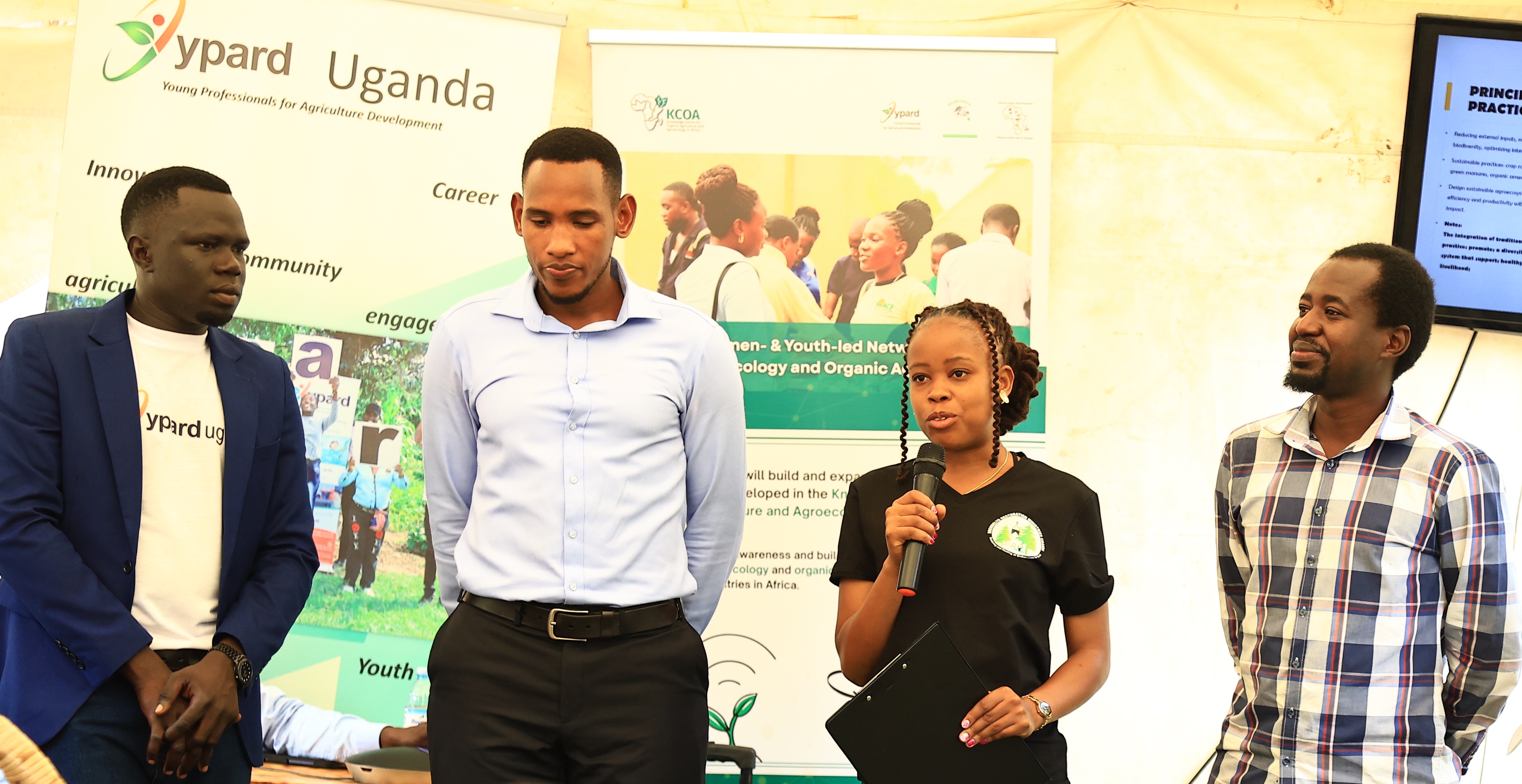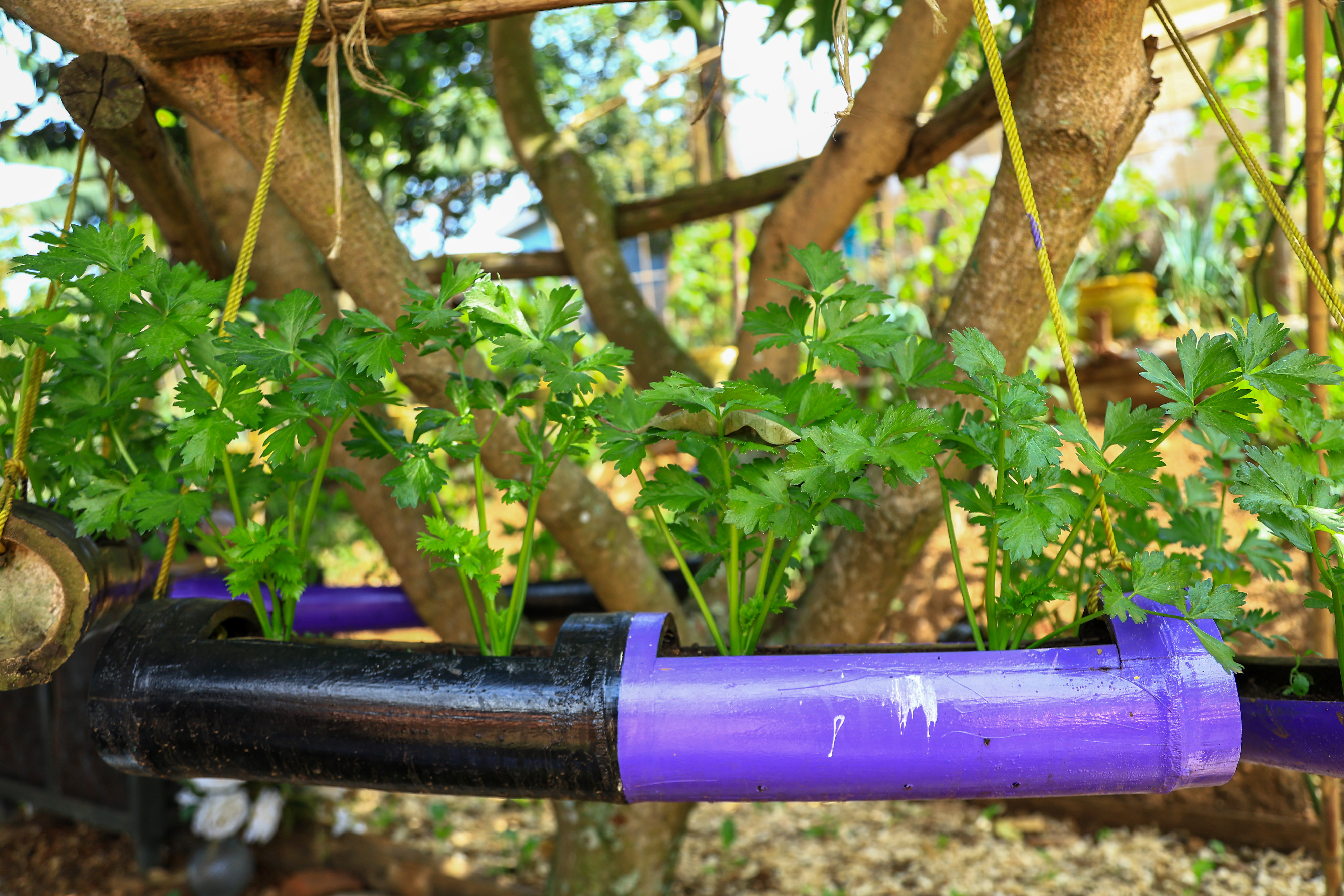The WYNA Programme will expand upon the experience and knowledge built through the Knowledge Centre for Organic Agriculture and Agroecology in Africa (KCOA) project, which is implemented by Deutsche Gesellschaft für Internationale Zusammenarbeit (GIZ) GmbH in cooperation with Biovision Africa Trust / ENDA ProNat / Sustainability Institute / SEKEM / CIPCRE. Young Professionals for Agricultural Development (YPARD), African Green Store Network(AGSN) and PELUM Kenya are the partner organizations collaborating on this programme. The launch event was held in a hybrid format, with over around 50 participants joining in person and over 60 online attendees.
The launch united a diverse group of farmers, agripreneurs, students, teachers, policy specialists, and community leaders to explore agroecology and organic agriculture as a driving force for women and youth leadership in reshaping Africa’s food systems. Agroecology was celebrated not only as a farming practice, but as a pathway to decent jobs, climate resilience, and intergenerational leadership at the event. The event was moderated by Ajuna Tadeo, Program Coordinator at YPARD.

The venue of the event was consciously chosen to reflect the agroecological, community, and women based approach of the project. The concept of Jero Farm was created by Anne Mugisha, who started the farm with the aim of establishing a profitable agribusiness for herself and her family, and co-founded it with her husband Richard. Anne and Richard have also been closely involved with the Knowledge Hub for Organic Agriculture and Agroecology in Eastern Africa (KHEA) [one of the 5 Knowledge Hubs of KCOA] and the Youth in Agroecology and Business Learning Track (YALTA) Programme of PELUM Kenya. The Farm is an agroecology social enterprise that promotes innovative nature based farming practices, including youth and women as key stakeholders in its operation.

The launch event had an energetic start with a powerful presentation by Josephine Akia, Country Coordinator of PELUM Uganda. In her keynote, Josephine underscored agroecology as both a science and a practice that can transform Africa’s food systems while tackling unemployment, climate change, and food insecurity. She emphasized that agroecology promotes sustainability, inclusivity, and innovation helping communities view food as medicine and enhancing resilience. Josephine also shared that public awareness of agroecology is growing across Africa through strong communication and media engagement. Mentorship initiatives such as AWOLA and YALTA are amplifying the voices of women and youth, building their confidence and visibility as leaders in agroecology.

One of the cornerstones of the WYNA Programme is to find synergies and partnerships with existing agroecology programmes. In this spirit, a cohot of fellows that went through an agroecology training by YPARD through the GP-SAEP project was present at the launch event. Emiru Jacob, one of the fellows, took centre stage to take the audience into a discussion about agroecology. His presentation framed agroecology as a holistic, participatory approach that integrates ecological, economic, and social sustainability into food systems. It emphasizes the interactions between plants, animals, soil, water, climate, and people to increase productivity while conserving natural resources. He mentioned key principles of agroecology including reducing external inputs, maximizing local resources, conserving biodiversity, and ensuring social equity. He was joined on stage by the other fellows, including Deborah, who shared her own experience of engaging with agroecology.
Under the WYNA Programme, the KCOA knowledge platform, titled ‘Knowledge Platform for Organic Agriculture and Agroecology in Africa’ will be expanded and promoted to reach a greater number of women and youth. To demonstrate the extensive knowledge on this platform, Francis Nsanga, Project Manager at KCOA gave an in-depth demonstration of the Platform at the launch event.
The Knowledge Platform for Organic Agriculture and Agroecology in Africa serves as a unified, user-friendly digital platform designed to close knowledge gaps and enhance access to information on organic agriculture across Africa. Built collaboratively by regional knowledge hubs and partner organizations, the platform consolidates resources on cultivation, ecological pest control, and agroecological practices, addressing the need for a centralized database tailored to African organic agriculture multipliers. Evolving into an interactive “Multiplier Network” by 2023, it now functions as a vibrant digital community that fosters networking, knowledge exchange, and collaboration across all African regions.

Mr. Nsanga highlighted the intricacies of the Platform, and presented how one can access the platform and the various formats of knowledge products on it. He also demonstrated the functioning of the Multiplier Network feature of the Platform. The launch saw 47 new users, mainly from Uganda and Kenya, indicating strong interest in organic agriculture knowledge, and underscored the value of practical demonstrations to boost platform visibility and utilization.

During the recent WYNA programme launch event, FAO Uganda, represented by Paul Emuria, the program Officer, reaffirmed its strong commitment to strengthening opportunities for youth and women within Uganda’s agri-food systems. In his address, Emuria highlighted FAO’s ongoing efforts to build the skills, confidence, and economic resilience of young people and women groups that remain central to the country’s agricultural transformation. He emphasized FAO Uganda’s continued investment in capacity-building initiatives, citing successful programmes such as the training of women in Fish processing. These initiatives focus on improving hygiene, value addition, and market competitiveness, which are essential steps in enhancing livelihoods and ensuring sustainability across agricultural value chains.
Emuria also underscored FAO’s regional priorities under its Strategic Framework, noting that youth engagement is a cornerstone of FAO’s vision for inclusive agri-food systems. Through the Rural Youth Action Plan (RYAP), FAO is actively promoting youth employment, entrepreneurship, and policy participation while ensuring that young innovators have the support and environment needed to thrive. In Uganda, FAO’s Integrated Country Approach (ICA) further strengthens rural youth employment by providing targeted training, mentorship, access to finance, and fostering youth-informed policy making. Emuria noted that these interventions complement initiatives like WYNA, hence creating a holistic ecosystem that uplifts young agripreneurs and women-led enterprises.
He concluded by acknowledging the value of collaborative projects like WYNA in accelerating progress: “When we bring together the strengths of partners committed to agroecology, youth empowerment, and gender inclusion, we move closer to building resilient, inclusive food systems that leave no one behind.”

Obaa Geoffery, the Technical Advisor for Agriculture, Markets and Rural Development at GIZ Uganda presented the Promoting Rural Development Programme (PRUDEV). PRUDEV was demonstrated as a key example of a successful programme implemented by GIZ Uganda with support from the EU, BMZ, and the Ministry of Local Government, that focuses on strengthening agro-based local economic development in Northern Uganda, particularly Adjumani, with a strong emphasis on women and youth.
Running from 2017 to 2027, PRUDEV addresses low investment in agro-based value chains by promoting sustainable production and marketing systems that create jobs, increase incomes, and enhance resilience. Its thematic focus areas include natural resources management and climate-smart agriculture, inclusion and resource efficiency of agro-based MSMEs, access to financial and non-financial services, and public-private sector engagement for sustainable local economic development. A key feature of the programme is the Community-Based Trainer (CBT) model, which bridges gaps in public extension services by providing tailored support directly to rural farmers.
Following the introductory sessions, YPARD, PELUM Kenya and AGSN shared their planned activities under the BWYNAAO Programme, aligning them with the broader project objectives. Discussions covered thematic areas such as national and global cafes, mentorship of fellows, and engagement in the KCOA digital knowledge-sharing platform. An overview of the ongoing fellowship application under this programme was also shared: the application round for fellows/interns generated extensive interest with more than 500 applicants expressing interest. These fellows will play a key role in advancing the programme’s impact at community and regional levels. The final fellows and interns will be announced by mid October 2025.

Participants had the opportunity to take a guided tour of Jero Farm, where they observed practical demonstrations of agroecological practices. The visit showcased how small spaces can be maximized to produce high-quality and nutritious food for both household consumption and market sale. Participants also learned about sustainable soil management, organic input use, and diversified farming approaches. The tour was led by Anne and Richard, with the youth employed in the farm also taking part in the discussions.
The host farm demonstrated a unique family-centered approach to agroecology. All members of the family actively participate in farm activities, creating a model that blends livelihood, learning, and creativity. Younger members of the family take on roles of communication through social media and documenting of the farm. During the launch, the family presented their story of farming and agroecology through poetry and a musical composition, illustrating the cultural and social dimensions of food systems transformation
Community members and participants showcased agroecological products ranging from organic fruits and vegetables to herbal teas and artisanic coffee. The exhibition created opportunities for sales, product promotion, and networking. It also demonstrated the potential of agroecology to generate income while meeting community nutritional needs.

The WYNA Programme is expected to deliver several key outcomes that contribute to the transformation of agrifood systems in Africa. It will enhance advocacy by increasing awareness, understanding, and appreciation of agroecology and organic agriculture, especially among women and youth. Through targeted capacity building, the programme will strengthen the skills and knowledge of young agrifood professionals in agroecological practices, entrepreneurship, and market linkages. Facilitating access to decent employment and green entrepreneurship opportunities in agroecology and organic agriculture, contributing to rural transformation and youth retention in agriculture will be other key outcomes of this programme.
Furthermore, networking and linkages among key actors including KCOA, PELUM Kenya, AGSN, and YPARD, will be strengthened in order to promote collaboration, peer learning, and sustained partnerships. Knowledge management will be a key emphasis of the programme- this will be promoted and advanced by supporting youth- and women-led innovation, storytelling, and co-creation within agroecology and organic agriculture. Ultimately, the WYNA Programme will empower women and youth to take leadership in shaping resilient, inclusive, and sustainable food systems across Africa.